The 10 Healthiest Dairy Foods for Weight Loss
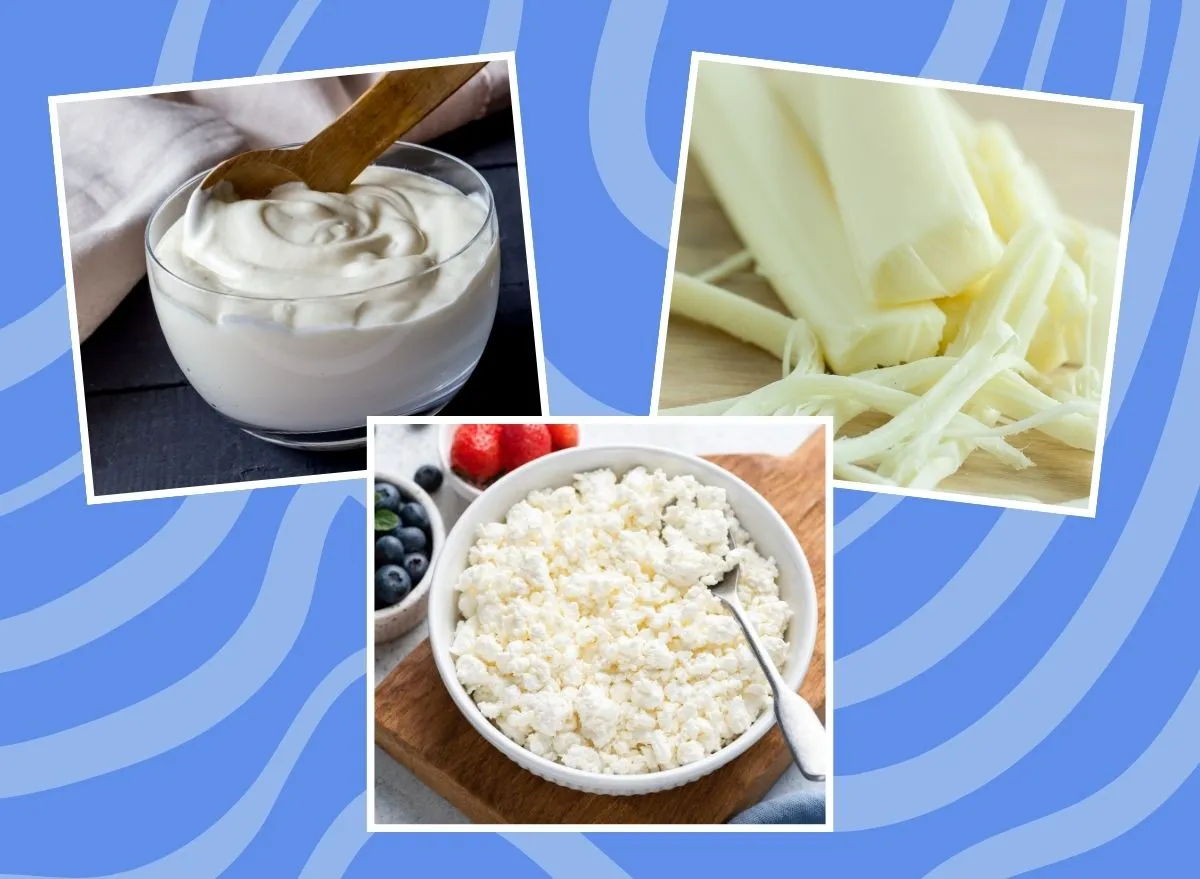
There's widespread uncertainty about whether or not dairy is good for you, especially when it comes to weight loss. Some concerns stem from the fact that many dairy foods are high in saturated fats associated with heart disease and weight gain or that consuming dairy may lead to inflammation. Additionally, many people are lactose intolerant and avoid dairy altogether. However, recent studies and expert opinions have challenged these beliefs and highlighted the benefits of consuming dairy foods for weight loss.
Dairy naturally contains important nutrients like calcium and protein, and research has shown that it can absolutely be a part of a balanced weight loss diet. One 2019 review found that dairy foods—even whole-fat options—don't lead to weight gain. In fact, they may decrease body fat and increase lean body mass. Additionally, consuming fermented dairy products, such as yogurt and cheese, is not only linked to a lower risk of cardiovascular disease but may also protect against type 2 diabetes.
S what are some of the best products for those looking to add dairy to their day, and how can these items specifically help with losing weight? We answered these questions by talking with a dietitian about the healthiest dairy foods and drinks. Read on to learn more, and check out these Easy 5-Ingredient Meals for Weight Loss.
2% milk
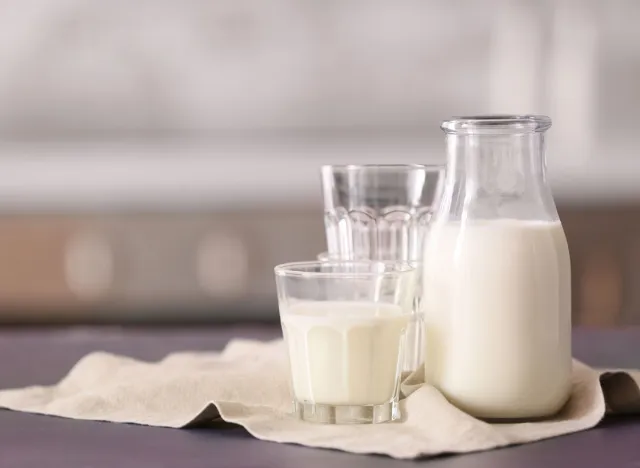
People may often assume that they can't have milk when they're trying to lose weight, often because it contains fat and natural sugars. But this simply isn't true! According to Lauren Manaker, MS, RDN, 2% milk can help you achieve your goals.
Manaker says, "2% milk can be a valuable component of a weight loss diet due to its balanced nutritional profile." For starters, "It delivers a moderate amount of fat, enhancing satiety and reducing the frequency of snacking on less healthy options," she says.
Manaker also adds that the protein content in 2% milk "aids in muscle repair and growth, which can be particularly useful after exercise sessions."
Beyond providing fat and protein to keep you full and help you build muscle, Manaker adds that the calcium it contains "is not only pivotal for bone health but may also play a role in body weight regulation." She adds, however, that "more data is needed to confirm this."
Regular Yogurt
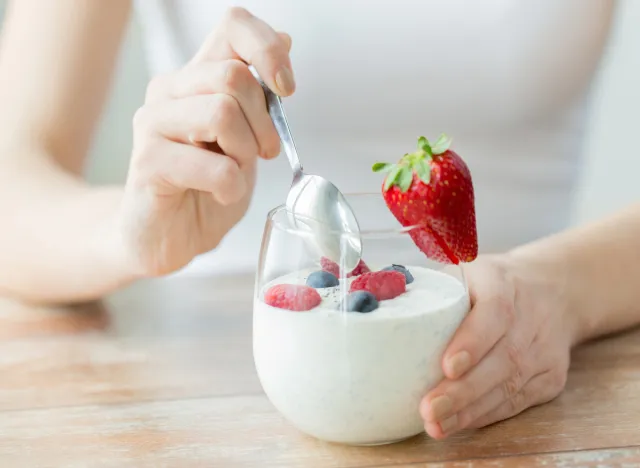
Whether you eat it with granola or berries, yogurt can be an extremely healthy part of your weight loss goals.
Firs, this dairy product contains protein, which can help you feel more satiated, boost your metabolism, and help you build lean muscle mass. On top of its protein content, yogurt is fermented, making it an excellent source of probiotics. These probiotics can directly improve your gut microbiome, and a healthy gut has been linked to greater weight loss and management.
According to a review of over 20 research studies published in the International Journal of Obesity, consuming yogurt has been linked to lower body weight, smaller waist circumference, and lower body fat.
Greek Yogurt
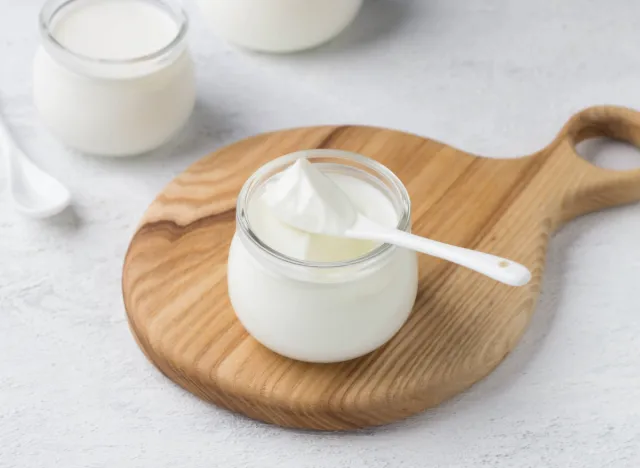
Greek yogurt is similar to regular yogurt; it just goes through an extra straining process that removes the whey liquids, which gives it a thicker texture and a tangier flavor.
Aside from the flavor differences, Greek yogurt is also naturally lower in sugar and higher in protein than regular yogurt. Protein can help you lose weight for many reasons, and some people choose to cut down on their sugar intake because of the link between high-sugar consumption and weight gain.
This makes Greek yogurt a great choice for those looking to increase their protein and reduce their sugar intake as part of their weight loss plan.
Skyr
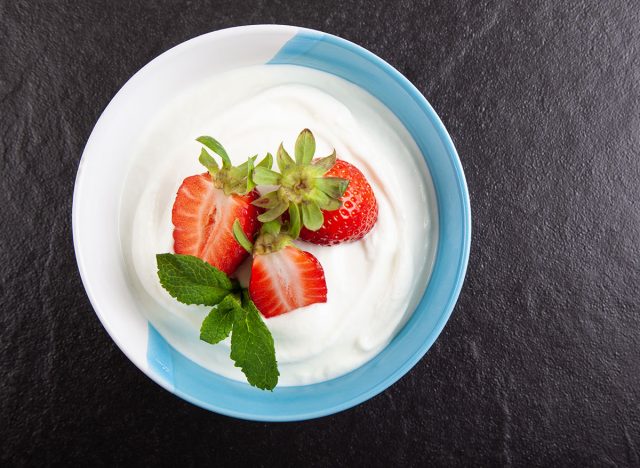
Throwing another type of yogurt into the mix, Skyr is an Icelandic dairy product that Manaker says works great as a part of a weight loss diet.
"The protein in skyr helps promote satiety, making one feel fuller for longer periods, which can lead to a reduction in overall calorie intake," she says. "Furthermore, the probiotics present in skyr aid in improving gut health, which is crucial for maintaining a healthy metabolism."
Kefir
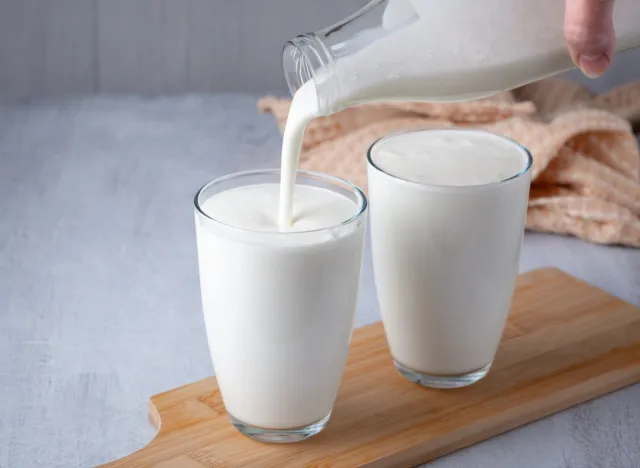
Kefir is a fermented product made from dairy milk, and according to Manaker, "this beverage is rich in probiotics, proteins, and various vitamins and minerals," and it makes for an excellent healthy dairy item for your weight loss goals.
"Its unique fermentation process, involving the culture of kefir grains in milk, results in a tangy, slightly carbonated drink that supports digestive health through its probiotic content," she says. "These beneficial bacteria may boost metabolism and enhance the body's ability to digest and assimilate nutrients effectively."
She also adds that "kefir's high protein content can increase feelings of fullness, reducing overall calorie intake and supporting weight loss efforts."
Cottage Cheese
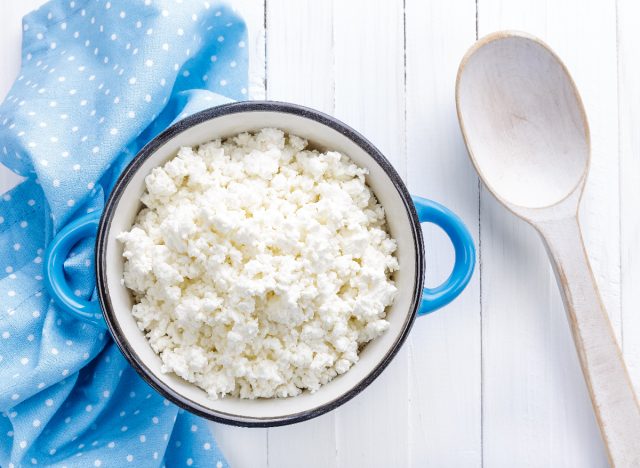
Cottage cheese stepped into the spotlight a few years back when people started realizing you can use it in a variety of recipes like smoothies, ice cream, dips, and even bread.
Because of how easy it is to add to your favorite foods, and the fact that it has a lower fat content and tons of protein, cottage cheese is an excellent dairy food for those trying to lose weight.
Labneh
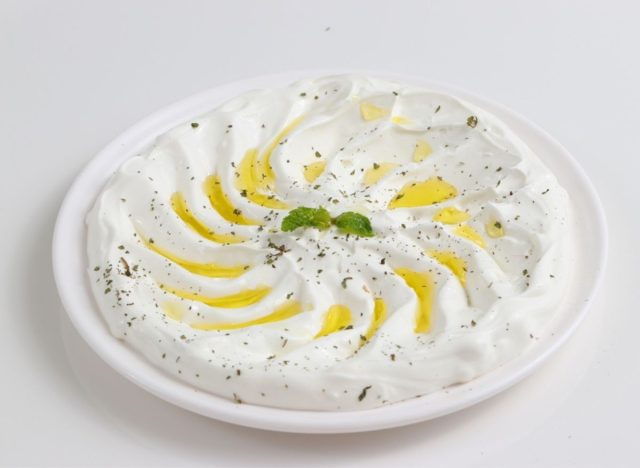
If you haven't tried labneh yet, you're missing out—not just because of its health benefits but because of its addictingly tasty flavors.
"A creamy, tangy cheese made by straining yogurt to remove most of its whey, labneh is a staple in Middle Eastern cuisine known for its versatility and health benefits," says Manaker. "Its high protein content makes it an excellent choice for those aiming to lose weight, as it can help in feeling fuller for longer periods, reducing overall calorie intake."
She adds, "the probiotics found in labneh assist in maintaining a healthy gut microbiome, which is crucial for digestion and may play a role in weight management."
String Cheese

Nope, string cheese isn't just for your kid's lunchbox. This snack is perfect for your weight loss goals because it's already portioned out so you don't have to worry about consuming too much. And on top of that, each stick contains a helpful dose of protein to keep you full until you're next meal. For instance, it of course depends on the type of cheese and brand, but a standard string cheese contains about 7 grams of protein for only 80 calories!
If you want to add some fiber to your snack, which is a nutrient that can also help you feel more full, add some apple slices or some whole-wheat crackers to your plate.
Fortified Milk
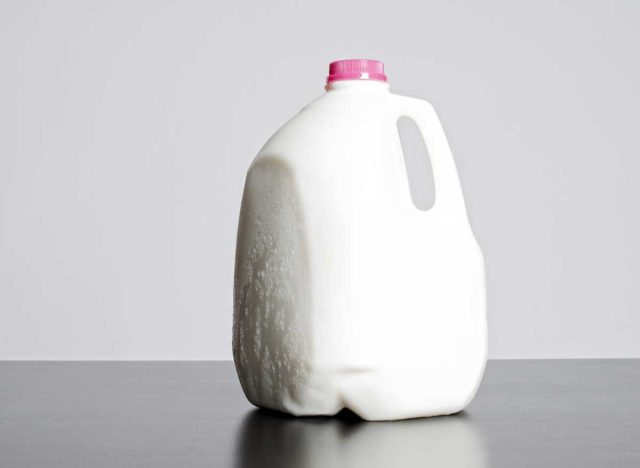
Any time you go to the store, you know there are rows and rows of different types of milk to choose from. Although we've already discussed that dairy milk comes with helpful nutrients like fat, protein, and calcium, you can also buy fortified cow's milk, which means certain vitamins have been added to the milk in addition to what's naturally there.
Fortified milk most commonly contains vitamins A and D, both of which have been linked to potentially helping with weight loss efforts.
According to a study published in the International Journal of Preventative Medicine, deficiency in vitamin D has been connected to a greater risk of obesity, and supplementing this vitamin can help with weight loss. Another study found that there is a possible connection between vitamin A and weight loss (as well as abdominal fat loss, specifically), but this was an animal study and more research is needed overall.
Because dairy milk in general can be helpful in people's efforts to lose weight, buying fortified milk when you feel you may be lacking in certain vitamins can help you even more.
Pre-Portioned Cheese Spreads
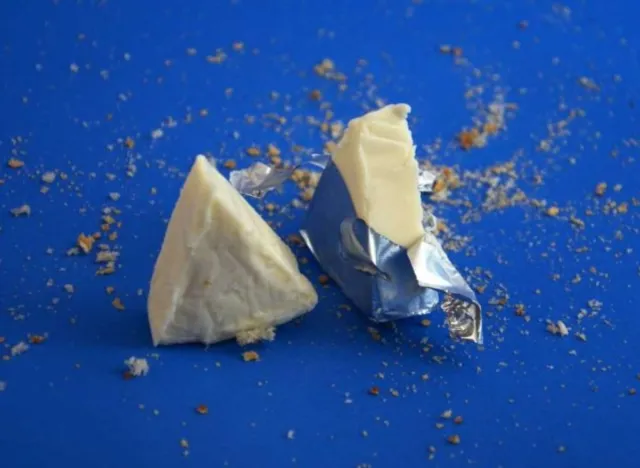
Similar to string cheese, pre-portioned cheese wedges are a great weight-loss snack. Many brands make spreadable cheese that comes individually wrapped and are lower in calories while still maintaining their protein and calcium content. These snacks work great for weight loss because you can keep your calories at bay and still enjoy a savory snack.
- Source: Mozaffarian D. Dairy Foods, Obesity, and Metabolic Health: The Role of the Food Matrix Compared with Single Nutrients. Adv Nutr. 2019 Sep 1;10(5):917S-923S. doi: 10.1093/advances/nmz053. PMID: 31518410; PMCID: PMC6743828.
- Source: Sun, L.; Goh, H.J.; Govindharajulu, P.; Khee-Shing Leow, M.; Henry, C.J. Differential Effects of Monounsaturated and Polyunsaturated Fats on Satiety and Gut Hormone Responses in Healthy Subjects. Foods 2019, 8, 634. https://doi.org/10.3390/foods8120634
- Source: FoodData Central. (n.d.-eg). https://fdc.nal.usda.gov/fdc-app.html#/food-details/1908865/nutrients
- Source: Pearson, A.G., Hind, K. & Macnaughton, L.S. The impact of dietary protein supplementation on recovery from resistance exercise-induced muscle damage: A systematic review with meta-analysis. Eur J Clin Nutr 77, 767–783 (2023). https://doi.org/10.1038/s41430-022-01250-y
- Source: Li, P., Fan, C., Lu, Y., & Qi, K. (2016). Effects of calcium supplementation on body weight: a meta-analysis. the American Journal of Clinical Nutrition, 104(5), 1263–1273. https://doi.org/10.3945/ajcn.116.136242
- Source: FoodData Central. (n.d.-ek). https://fdc.nal.usda.gov/fdc-app.html#/food-details/171284/nutrients
- Source: Moon J, Koh G. Clinical Evidence and Mechanisms of High-Protein Diet-Induced Weight Loss. J Obes Metab Syndr. 2020 Sep 30;29(3):166-173. doi: 10.7570/jomes20028. PMID: 32699189; PMCID: PMC7539343.
- Source: Stokes T, Hector AJ, Morton RW, McGlory C, Phillips SM. Recent Perspectives Regarding the Role of Dietary Protein for the Promotion of Muscle Hypertrophy with Resistance Exercise Training. Nutrients. 2018 Feb 7;10(2):180. doi: 10.3390/nu10020180. PMID: 29414855; PMCID: PMC5852756.
- Source: Hadjimbei E, Botsaris G, Chrysostomou S. Beneficial Effects of Yoghurts and Probiotic Fermented Milks and Their Functional Food Potential. Foods. 2022 Sep 3;11(17):2691. doi: 10.3390/foods11172691. PMID: 36076876; PMCID: PMC9455928.
- Source: Aoun A, Darwish F, Hamod N. The Influence of the Gut Microbiome on Obesity in Adults and the Role of Probiotics, Prebiotics, and Synbiotics for Weight Loss. Prev Nutr Food Sci. 2020 Jun 30;25(2):113-123. doi: 10.3746/pnf.2020.25.2.113. PMID: 32676461; PMCID: PMC7333005.
- Source: Eales, J., Lenoir-Wijnkoop, I., King, S. et al. Is consuming yoghurt associated with weight management outcomes? Results from a systematic review. Int J Obes 40, 731–746 (2016). https://doi.org/10.1038/ijo.2015.202
- Source: Yogurt. (2023, February 2). The Nutrition Source. https://www.hsph.harvard.edu/nutritionsource/food-features/yogurt/
- Source: Stanhope KL. Sugar consumption, metabolic disease and obesity: The state of the controversy. Crit Rev Clin Lab Sci. 2016;53(1):52-67. doi: 10.3109/10408363.2015.1084990. Epub 2015 Sep 17. PMID: 26376619; PMCID: PMC4822166.
- Source: FoodData Central. (n.d.-ei). https://fdc.nal.usda.gov/fdc-app.html#/food-details/776018/nutrients
- Source: Fujisaka, S., Watanabe, Y., & Tobe, K. (2023). The gut microbiome: a core regulator of metabolism. Journal of Endocrinology, 256(3), e220111. Retrieved Apr 16, 2024, from https://doi.org/10.1530/JOE-22-0111
- Source: Koutoukidis DA, Jebb SA, Zimmerman M, Otunla A, Henry JA, Ferrey A, Schofield E, Kinton J, Aveyard P, Marchesi JR. The association of weight loss with changes in the gut microbiota diversity, composition, and intestinal permeability: a systematic review and meta-analysis. Gut Microbes. 2022 Jan-Dec;14(1):2020068. doi: 10.1080/19490976.2021.2020068. PMID: 35040746; PMCID: PMC8796717.
- Source: FoodData Central. (n.d.-ej). https://fdc.nal.usda.gov/fdc-app.html#/food-details/432442/nutrients
- Source: Moon J, Koh G. Clinical Evidence and Mechanisms of High-Protein Diet-Induced Weight Loss. J Obes Metab Syndr. 2020 Sep 30;29(3):166-173. doi: 10.7570/jomes20028. PMID: 32699189; PMCID: PMC7539343.
- Source: FoodData Central. (n.d.-el). https://fdc.nal.usda.gov/fdc-app.html#/food-details/328841/nutrients
- Source: FoodData Central. (n.d.-eh). https://fdc.nal.usda.gov/fdc-app.html#/food-details/447134/nutrients
- Source: Moon J, Koh G. Clinical Evidence and Mechanisms of High-Protein Diet-Induced Weight Loss. J Obes Metab Syndr. 2020 Sep 30;29(3):166-173. doi: 10.7570/jomes20028. PMID: 32699189; PMCID: PMC7539343.
- Source: FoodData Central. (n.d.-em). https://fdc.nal.usda.gov/fdc-app.html#/food-details/532509/nutrients
- Source: Salleh SN, Fairus AAH, Zahary MN, Bhaskar Raj N, Mhd Jalil AM. Unravelling the Effects of Soluble Dietary Fibre Supplementation on Energy Intake and Perceived Satiety in Healthy Adults: Evidence from Systematic Review and Meta-Analysis of Randomised-Controlled Trials. Foods. 2019 Jan 6;8(1):15. doi: 10.3390/foods8010015. PMID: 30621363; PMCID: PMC6352252.
- Source: Khosravi ZS, Kafeshani M, Tavasoli P, Zadeh AH, Entezari MH. Effect of Vitamin D Supplementation on Weight Loss, Glycemic Indices, and Lipid Profile in Obese and Overweight Women: A Clinical Trial Study. Int J Prev Med. 2018 Jul 20;9:63. doi: 10.4103/ijpvm.IJPVM_329_15. PMID: 30123437; PMCID: PMC6071442.
- Source: Jeyakumar SM, Vajreswari A. Vitamin A as a key regulator of obesity & its associated disorders: Evidences from an obese rat model. Indian J Med Res. 2015 Mar;141(3):275-84. doi: 10.4103/0971-5916.156554. PMID: 25963488; PMCID: PMC4442325.









